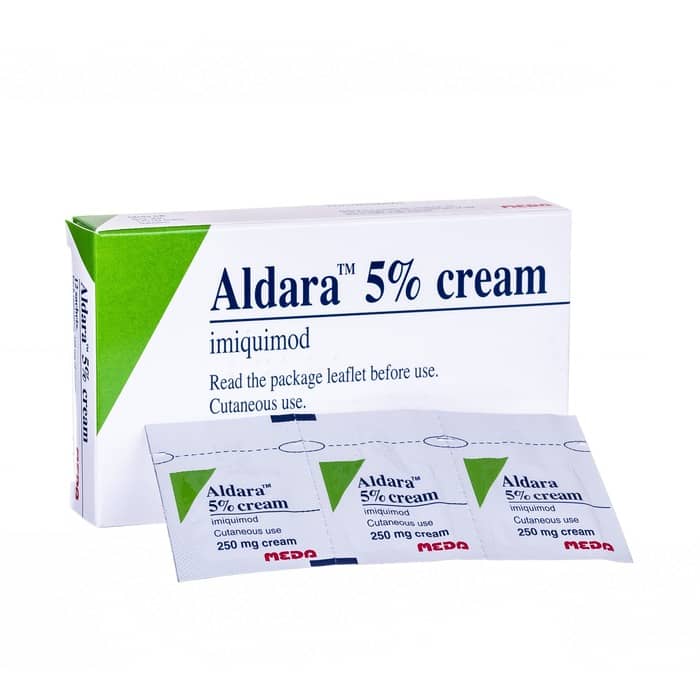Buy Aldara EU | What is Aldara?
Buy Aldara EU | Aldara is a prescription medication that is primarily used to treat certain skin conditions such as actinic keratosis (a precancerous skin condition), superficial basal cell carcinoma (a type of skin cancer), and external genital and perianal warts. The active ingredient in Aldara is imiquimod, which belongs to a class of drugs known as immune response modifiers.
Imiquimod works by stimulating the body’s immune system to produce interferon, a substance that helps fight against abnormal cells and viruses. It activates the production of cytokines, which are proteins involved in regulating the immune response. This immune response helps to eliminate the abnormal skin cells or viruses, thus treating the underlying condition.
Aldara is available in the form of a cream, and it is typically applied directly to the affected area of the skin. It is essential to follow the instructions provided by your healthcare professional for the proper application and duration of treatment.
It is important to note that Aldara is a prescription medication and should only be used under the guidance and supervision of a healthcare provider. Your doctor will determine if Aldara is the right treatment option for your specific condition and provide you with the necessary instructions for its use.
How does Aldara work?
Aldara, also known by its generic name imiquimod, is a topical cream that works by stimulating the body’s immune system. It is classified as an immune response modifier and is primarily used to treat certain skin conditions such as actinic keratosis, superficial basal cell carcinoma, and external genital and perianal warts.
When applied to the affected area, Aldara activates the production of cytokines, which are proteins involved in regulating the immune response. The cream stimulates the release of interferon, a substance that helps fight against abnormal cells and viruses.
By enhancing the immune response, Aldara helps the body recognize and eliminate abnormal skin cells or viruses present in the affected area. This mechanism of action helps in the treatment of various skin conditions, including precancerous lesions and certain types of skin cancer.
It is important to note that the exact way Aldara works may vary depending on the specific condition being treated. The cream should only be used as directed by a healthcare professional, and the recommended dosage and treatment duration should be followed carefully.
How Do I Take Aldara?
When using Aldara, it is crucial to follow the instructions provided by your healthcare professional to ensure safe and effective use. Here are some general guidelines on how to take Aldara:
- Wash and dry the affected area: Before applying Aldara, make sure the area is clean and dry. Gently wash the area with mild soap and water, and pat it dry with a clean towel.
- Apply a thin layer of cream: Use your fingers to apply a thin layer of Aldara cream directly to the affected area. Rub the cream gently into the skin until it disappears.
- Wash your hands: After applying the cream, wash your hands thoroughly to remove any residue.
- Leave the cream on for the recommended duration: The duration of application may vary depending on the specific condition being treated. Your healthcare provider will provide you with detailed instructions on how long to leave the cream on.
- Wash off the cream: After the recommended application time has passed, gently wash off the cream with mild soap and water.
- Follow the prescribed treatment schedule: Aldara is usually applied three times a week, with no more than one application per day. It is important to follow the prescribed treatment schedule provided by your doctor.
- Continue the treatment until advised otherwise: It is essential to complete the full course of treatment as prescribed, even if the symptoms improve or disappear. Do not stop using Aldara without consulting your healthcare provider.
Remember, these instructions are general guidelines, and it is important to follow the specific directions provided by your healthcare professional for your particular condition.
What are the side effects of Aldara?
Like any medication, Aldara can cause side effects, although not everyone experiences them. Common side effects associated with Aldara may include:
- Local skin reactions: This is the most common side effect of Aldara. It can cause redness, swelling, itching, burning, and tenderness at the application site. These reactions usually occur within the first few weeks of treatment and may improve as the treatment continues.
- Flu-like symptoms: Some individuals may experience flu-like symptoms such as fever, fatigue, headache, muscle aches, and chills. These symptoms are typically mild and temporary.
- Skin dryness and flaking: Aldara can cause dryness, flaking, or scaling of the skin at the application site.
- Application site reactions: In some cases, Aldara may cause blisters, sores, or ulcers at the site of application. If you notice any severe or persistent skin reactions, it is important to contact your healthcare provider.
- Systemic side effects: Although rare, Aldara can occasionally lead to systemic side effects, such as dizziness, nausea, vomiting, diarrhea, and changes in blood pressure. If you experience any of these symptoms, seek medical attention immediately.
It is important to consult your healthcare provider if you experience any side effects while using Aldara. They can provide guidance on managing the side effects or determine if any adjustments to the treatment plan are necessary. Additionally, inform your healthcare provider about any pre-existing medical conditions or medications you are taking to ensure the safe use of Aldara
Buy Aldara EU | Buy Aldara EU
Only logged in customers who have purchased this product may leave a review.






Reviews
There are no reviews yet.